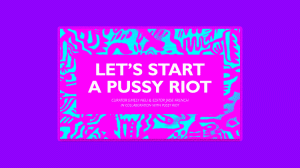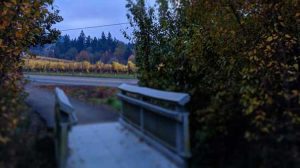
Imagine your freedom even to walk outdoors curtailed.
Imagine the most powerful countries in the world refused to believe your experience, or blamed you for it when you dared complain.
It’s not a far prospect, even in America, where my country’s rhetoric of denial insists that “it couldn’t happen here.” This in spite of the fact that it happens here all the time.
I’ll give you an example from my own Pacific Northwest. It’s 1996. Pacific Lumber, a profit-mongering company somehow allowed to own — not to steward, to own, which means do whatever you like with — vast tracts of endangered ancient forest, clearcut a nearly vertical slope above the town of Stafford, California. On New Year’s Eve, that slope, now merely mud, liquified and devoured seven homes. The lumber company told residents their logging was perfectly legitimate — only what was owed them, you see — and not at fault for this ruination and despair. It took a court case, lasting several years, to convince them, at least publicly, otherwise. It happened there.
I’ll give you a more sweeping example. In 2018, the interests (and inertia) of profit as determiner of fates continue to deny our country’s role in accelerating the destabilization of our climate. We — and the rest of the planet — suffer endless “hottest years on record,” and invent higher category ratings for increasingly destructive storms. The health of the vulnerable is squeezed by billowing wildfires lasting longer, polluting rivers, and torching carbon sinks. It’s happening here.
And I’ll give you an example on which all of that is predicated. In 1492, a man we would now refer to as white dropped anchor in the Caribbean, and the paired continents we colonizers call “the New World” have never recovered. Their original people, in particular, have been starved, forcibly relocated, denied their traditions, denied even acknowledgement of their humanity. It’s been happening here for centuries.
So. By now we should be well-practiced at decrying colonial violence. Regrettably, we are not accomplished enough. Witness the deafening silence of the American establishment with regard to Palestine.
I was raised in a middle-class home, by kind, compassionate people who identified as conservative. Understand, they were Reagan conservatives, not quite what the term means in American politics today. My parents are well-educated, well-read, well-spoken exemplars of (small-l) liberal values. And when I mention Palestine to either of them, they begin their defensive response with the “both sides” argument.
I’ve learned to despise that argument, because it’s no such thing. It dismisses the concerns of every person and ideology involved. It assumes equivalency between points of view, between power structures. It’s an attempt to sound both sensitive and rational, and it’s a smokescreen. Rationality is overrated. Sensitivity is only useful when there’s empathy behind it.
If I seem to be picking on my parents here, I am not. Their response is typical of Americans who tend to align with the establishment. It was my own response, for many years. I thought I was being fair to everyone. The only thing I was doing for “both sides” was ignoring them.
There’s a woman at my church who’s trying to get funding for a congregational trip to the Holy Land. She doesn’t mean a tourist visit. She went six years ago, and in addition to seeing the official sites, she stayed in Palestinian homes, shared meals, played with children. Back in the States, she facilitates the sale of olive oil grown and pressed by Palestinian families, secures funding to subsidize tickets to a local Palestinian film festival, and speaks up, relentlessly, about what’s happening in occupied Palestine. She’s intense. I tend to avoid intense people. (See above note about how I was raised.) But lately I’ve tried gravitating toward them. They so often have something to say when I, in my civility, have missed the point.
One of my favorite authors is called Robert MacFarlane. On the surface, he’s about as establishment-liberal as you can get: white, male, British, a Cambridge professor. He writes about mountain climbing, language, and walking in the UK. He also wrote about walking in Palestine. In The Old Ways, he introduced his readers to Raja Shehadeh, a human rights lawyer, a friend of his, and a Palestinian from occupied Ramallah. I’ve read with discomfort, every time, the chapter he devotes to walking with Shehadeh. There are active guns involved, and feral dogs, and checkpoints, and constant, petty injustices — none of which sat well with my sanitized, both-sides understanding of the ongoing territorial war.
What I hadn’t read, until earlier this year, was Shehadeh’s own Palestinian Walks.

Raja Shehadeh
The book is framed around the idea of sarha — a wander, more or less, without a fixed duration, destination, or intent. Not a pilgrimage and not an afternoon hike, not something undertaken because you need the exercise. Sarha is about stepping away from constraints. I felt the sense of the unknown word immediately. And I felt it, immediately, as an elegy.
Shehadeh loves walking the way I do: the freedom of the hills is breathing to him; it tells him he is alive. His book proceeds to grab us by the shoulders and wrench us around to see how the breathing of Palestine — the land, the people, their culture — is daily crushed between the strangling hands of occupation.
So I’ve been contemplating, every time I see an item of “Middle East” news, every time my church acquaintance gets up to make an announcement, the terror of living in your own land, hostilely occupied. I’ve been imagining the tension, the confusion, of settling already-lived-in acreage that your God once promised your ancestors, and so, by extension, you. And I’ve been reading other accounts of the conflict, as it plays out in Israeli and Palestinian daily life. We in America know so little of what really goes on there.
The other thing I keep doing is returning to Palestinian Walks. I’ll pluck it off the shelf and flip to an underlined passage. And begin by just sitting with it. Whatever you think you understand about the modern Holy Land, there’s something here to challenge you.
I don’t underline for education, I do it for impact. If a passage, or a phrase, or just a word strikes hard in beauty or in pain, that’s when I mark it. I’ve trained myself not to do this unless the need rises up, and also to do this without thinking too hard about my choice. The point of the exercise is engagement with the text by intuition and instinct — to discover what resonates, what makes you angry, what feels right, and what you want to talk back to.
I don’t do this in every book, just the resonators. Just the ones that catch like Shehadeh’s natsh (a versatile thistle with its own fascinating story) in my heart. There is no other pattern to the books I’ve marked in this way. Under the Tuscan Sun. The Seabird’s Cry. C.S. Lewis’ frustrating Mere Christianity. Richard Powers’ massive and obliterating The Overstory.
What I like to do with these markings is to read them as a new commentary on the text. If I’ve made the time, I don’t sit only with the first underlined passage I find. I start from that passage, and flip to the next, and the next, reading them as a text of their own, allowing the words and the feelings they raise in me to become illuminated by their new connections.
Reading is always an act of co-creation with an author. I like to lift that up, by this intentional practice of creating a new context in which to engage with an author’s most difficult, beautiful, frustrating, affecting words.
I wish my high school English teachers had taught me this alongside the practice of marginalia. That style of engagement made precisely no sense to 17-year-old me. I thought I was wasting my time, marking up Pride & Prejudice with cross-references and “significant passage” highlights. I didn’t want to clutter up my beautiful pages with notes about theme and character I’d never need to revisit. What had that to do with deriving meaning from a text? I was a Romantic back then: meaning was only to be discovered through intensity of feeling.
Hugely for this reason, I swore off literature classes in university, tested out of freshman English, and spent my three years until graduation studying the social sciences. I have since rediscovered literary criticism, and the value of (judicious) marginalia. But I still think this more elemental practice has a unique ability to tap deep wells inside a work of literature.
Very recently, from a podcast I adore called Harry Potter and the Sacred Text, I learned that my peculiar form of textual conversation has a name. (Of course it does; did I imagine I invented it? Probably.) It’s a medieval monastic practice, and it’s called, beautifully, florilegia.
In a florilegium (singular), you note the words and phrases that sparkle out to you from a text. When you’re done writing them down (or underlining, if you like), you have a new text, derived wholly from the old and yet entirely fresh. Depending on how you arrange your “sparklets,” your new text may summarize, or dispute with, or shine new light on the original piece. All of the above at once, perhaps, which is a mystery of poetry, and this is certainly a practice of poetic imagination.
Here, then, is my florilegium for Palestinian Walks. I want to leave you with Shehadeh’s words, not mine, so this is as far as I’m willing to guide you. Note that the punctuation is mine, but I’ve only copied the words, and always (within a particular sparklet) in order. Walk on alone, and see what resonates. Ask yourself: where do I walk, from here?
When I could walk without restraint,
the experience of open space made us giddy with joy.
It was essential not to hesitate, but to venture
out and take walks where it was still possible.
The water was thick with reeds and spearmint,
the tentative midday moon high up in the sky.
Palm, olive, citrus, oleander, and cypress;
a beautiful cliff studded with cyclamens.
Perhaps a miracle had occurred in this wilderness
when it still had deer.
To assert the holiness of this cursed land,
Israel was going to leave
“an entirely different map of the country.”
This was how those who believed
they were serving a higher purpose
behaved.
I had intended to sit under the pine tree and read,
but the sight of the hills spread out before me,
clear and fresh, with the olive trees washed with the rain…
I felt the ground on which I anchored myself
tilting. The language of conquest was written large
over the hills, over the wilderness,
in every corner of the land.
And nothing was in between.
The mind only admits what it can handle,
and here on the hills the threshold was higher.
When I look at night from the roof of my house
at the horizon, I can see the yellow lights creating
an illuminated noose around the city.
Such beautiful fields, such a beautiful, spoiled country!
I too have been crying out in a wilderness,
to a world that did not hear.
Who wants to listen to the vanquished?
And reading is not like seeing.
Soldiers look out of place in these hills,
as perhaps they do on any hill,
anywhere
in the world.
“Someday you will know
what I have come to know.”




Karen Shepersky says
You already know I have progressed in many ways since the particular time frame you note in your review and am still learning every day. This sounds like an intriguing book.
Chris says
This is wonderful. I am ordering this book as soon as I return to my post at the bookstore!